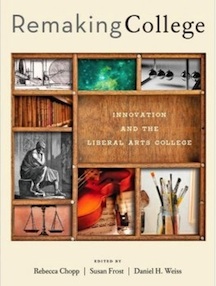By Sean Ross Meehan
This spirited collection of essays offers lessons in what the rhetorician Richard Lanham once called “the oldest class in American education, the Seminar on the Future of the Liberal Arts.” Drawn from papers first presented in 2012 at the conference “The Future of the Liberal Arts College in America and Its Leadership Role in Education Around the World,” hosted by Lafayette and Swarthmore, this version of that recurring seminar proposes two timely focal points in its orientation. All of the essays focus on the question of the liberal arts in America from the perspective of the smaller, residential liberal arts college, and the majority of the seventeen contributions come from sitting presidents of its most recognizable institutions. These include the presidents of Lafayette and Swarthmore who serve as editors, colleagues from Bryn Mawr, Macalester, and Wheaton among others, and a concluding essay by William Bowen, former president of Princeton and the Mellon Foundation, titled “More to Hope Than to Fear.” This genre tends to be populated by former university administrators who, once retired, suggest we should return to the core mission of the liberal arts upon which the American college was founded. Though preaching largely to the converted, as such arguments tend to do, the current, administrative perspectives offered here from the original American home of liberal education, the college and not the university it transformed into, offer a welcome contribution to the ongoing conversation of the values of the liberal arts.
The “innovation” of the subtitle responds, of course, to the economic exigencies of the American marketplace of higher education in recent years, as well as emerging challenges to the traditional, high-cost model of small-scale liberal education from apparent promise of open online learning. Through most of the essays, to “remake” the small liberal arts college means to renew its longstanding and distinctive mission, and a point emphasized here, its remarkable success, in cultivating intellectual flexibility among its students. Across varying discussions, these leaders argue that “flexibility,” a significant term in the volume, will continue to characterize the agility and adaptability that the liberal arts college produces in its graduates and reflects in its own longevity. There will need to be continuing innovation, in other words, but the renewal will be guided, these leaders suggest, but what our best colleges do well. As the president of Wheaton College argues in his contribution, leaders should “double down on the core mission” of the liberal arts college in order to provide clarity in the “cacophony of voices” that call for liberal education to move away from its core values.
The strongest version of this claim for the innovative tradition of liberal education comes in the essay by Adam Falk, president of Williams College, who addresses the frenzied question of technology and distance learning in liberal education (“revolution or evolution?”) by declaring that “we should fiercely resist the reflexive conclusion” that “we must become like” our multitasking and multimediated students “if we are to reach them and educate them.” As Falk goes on to argue in emphasizing the “intimate, collaborative environment” of the liberal arts college as its “defining structure,” “educational innovation need not involve semiconductors.” We may have reached a point in American higher education where the call for such purpose-driven resistance by a college president is itself innovative. It suggests that this contribution to the seminar in the future of the liberal arts college and its focus on meaningful innovation might be answered best by hearing the voices of current faculty who cultivate flexibility in the college classroom and the coaches and staff who guide it across the campus.
Sean Ross Meehan (ΦBK, Princeton University, 1991) is Associate Professor of English and Director of Writing at Washington College. He is a resident member of the Theta of Maryland chapter of Phi Beta Kappa.




